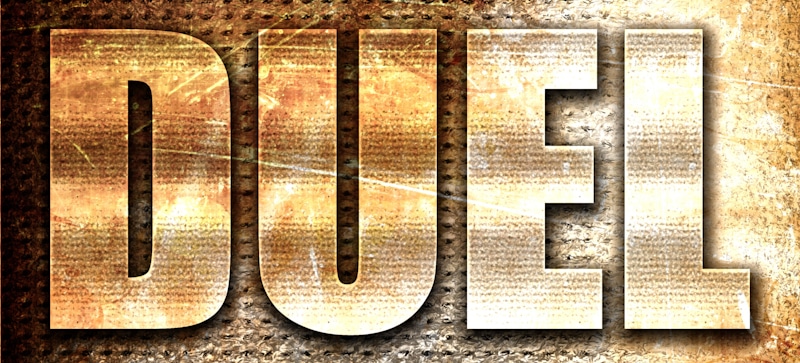The actual reason behind the English language having similar-sounding words, with also similar spellings, is not clearly known or justified. But the fact that such pairs of words, referred to as “homophones”, are confusing is well-established. The terms “dual” and “duel” represent a word pair that is both popular and confusing to many people.
The word “dual” means “two” or “double”. It should be used in contexts where the goal is to refer to two things that are related or not wholly separate from each other. The term “duel”, on the other hand, denotes a “contest”, “competition”, etc. and must be used in sentences accordingly.
Do not weaken your manuscripts or come across as an average writer by using the “dual” and “duel” interchangeably. If you think you are likely to fumble between the two terms in your writings, keep reading to learn the meanings of the two terms, how they get used in sentences, trick(s) to draw a clear line of distinction between the two, and more.
“Dual” – Definition

The word “dual” means “double” or “two”. It could either be used as a noun or as an adjective. The word is usually used to denote “a pair of things” or “two sides of the same coin”, metaphorically speaking.
The term “dual” dates back to the early 1600s, having its roots in “dualis”, a Latin term that shares its meaning with “dual”.
“Duel” – Definition
The noun/verb “duel” denotes “a fight”, which could entail or imply violence.
In the past, a “duel” meant “a formally arranged contest or battle to death between two individuals”. These fights were typically fought between muscular, mustache-sporting men. A “duel” was invariably instituted to defend individual honors or win over things and even women.
Such “barbaric” contests are not held anymore, causing the meaning of the word “duel” to widen its scope and mean “contests held between two individuals, teams, ideas, etc.”. “Duel” could also mean “a conflict between incompatible ideas” or “arguments between groups or people”.
The word “duel” has its roots in “duellum”, a Latin term that means “war”. Other words or synonyms for “duel” are “competition”, “confrontation”, “combat”, “contest”, “face-off”, “match”, “grapple”, etc.
Using “Dual” in Writings
When used as an adjective, which it mostly is, the word “dual” almost always refers to “two parts or aspects of one or the same thing”. “Dual” usually denotes a couple of things that belong to the same person or thing – for instance, a hot/cold colleague with their dual personality.
An individual supposedly has “dual” citizenship if they are the citizen of two separate nations. For example:
- Johan apparently has dual citizenship as he holds passports from both Germany and Canada.
The term is typically not used in sentences when it doesn’t denote two related things. In the following sentence, for example, the usage of “dual” is not the most ideal:
- Her reasons for not coming to class yesterday were dual.
The term “dual” doesn’t fit in or work well in the above sentence because the “reasons” for the action may have been disparate or not related at all.
Using “Duel” in Writings
The word “duel” can either be used as a noun or a verb. In both instances, however, the word means “a fight” or “a competition”. Unlike “dual”, it is never used as an adjective.
Thanks to the pedigree of the term, the word “duel” is mainly used to denote a classic sword fight or similar battles with a slightly modern twist.
In the past, “duel” meant a fight that entailed the usage of weapons. Modern, formerly organized duels, however, are usually devoid of arms of any kind. A boxing contest or an MMA (mixed martial arts) fight, for instance, does not entail the use of arms.
The word “duel” is also used in a lot more casual context. For example:
- The two, who were arguing over the last slice of pizza, decided to play a friendly game of chess, with the one winning the duel getting the pizza slice.
As mentioned above, “duel” refers to a fight that came to a finish only if one of the fighters died. Here are a few sentences alluding to that connotation:
- A well-regulated duel was viewed at or misconceived as an ordeal that represented God’s judgment in earlier days.
- The knight, who felt insulted by the remarks, challenged the man to a duel.
When used as a verb, “duel” denotes “to fight”, like when the word is used as a noun. For example:
- The two, who were arguing over the pizza, decided to duel with each other to ascertain who gets the slice.
- The two kids were dueling with faux swords.
- I can duel her if needed to ascertain who gets to drive the Ferrari first.
- Dueling the evil forces gives him a sense of pride and accomplishment.
- We shall duel at high noon in the square.
While the term “duel” could be employed as the synonym for “argue” or “battle” and similar words, it should be used only when that battle or argument is between two people or entities only. In other words, two knights can “duel”, and even two battalions “duel”, but three or more soldiers do not “duel” or engage in a “duel”.

Remembering the Difference Between “Dual” and “Duel”
The clear and most obvious difference between the terms “dual” and “duel” is their minor spelling change. “Dual” has the letter “a” in it, while “duel” has the alphabet “e” in place of “a”. Not to mention, the two words have completely different meanings, as clearly explained above.
If the spelling and meaning differences between the two do not help you distinguish one from the other, this particular mnemonic trick may help you.
In other words, make a note of the fact that both the word “dual” and the term “sandal” end in “-al”. Not to mention, “sandals” are worn by people in pairs or as “dual sandals”. Let this relationship between the two words help you remember the spelling or meaning of “sandal”, thereby easily distinguishing it from “duel”.
Though this mnemonic trick might seem a bit ludicrous at first, it will help you remember the distinction between “dual” and “duel” if you give it a shot.
Example Sentences with the Word “Dual”
Here is a list of sentences that employ the term “dual”, primarily as an adjective:
- The team took the field with dual purposes in mind.
- Justine installed a new dual-speaker system in her car.
- The term “like” could mean a couple of things. In other words, it has dual meanings.
- She has dual personalities. At times, she is kind, and sometimes she is outright mean.
- Ernie has dual jobs – as an accountant during the day and as a writer after dusk.
- Mary has dual citizenship since her mother is from London, and her dad is from Montreal.
- My laptop serves dual purposes, as it helps me with my work, and I also use it for entertainment.
- Beth had a dual diagnosis carried out – for her alcohol dependency and bipolar disorder issues.
- This engine has a “dual prop” engine.
- After her marriage, she will retain her dual nationality.
- The dual losses have raised pertinent questions about their political future.
- As a content creator and also as a manager, you’ll be performing dual roles.
- She is very particular about what she wears to the office. When at home, however, she just doesn’t care about her outfits. She is basically living a dual life.
Example Sentences with the Word “Duel”
The following are sentences using the word “duel”:
- They chose to duel with words and not swords.
- Settling an argument through a duel is not always wise.
- They were involved in a humor-filled duel.
- Besides the much-awaited duel between Drew and Tom, the game has a lot more to offer.
- Aaron challenged Alexander to a duel.
- Ben and Tony were engaged in a continuing duel of wits.
- If I stopped, she stopped. If I moved, she moved too. It was basically a duel.
- This day marks the beginning of a fascinating political duel.
- Courtesy of the duels that happened between the guerrillas and the regime, most parts of all the villages were totally wiped out.
- What was the duel all about anyway?
- She was aware of the duel and wanted to share her unfiltered thoughts about it.
- Her dad was killed in the duel when she was just nine.
- The exact date on which the duel between their admirers started is not known.
Conclusion

“Dual” is an adjective and at times a noun, and “duel” can be either a noun or a verb. And there are clear differences between the two in their meanings. Here is an example sentence using the two words “dual” and “duel” in the same sentence, proving that the two are indeed different:
- If you are growing tired of your close friend’s dual personality, you must let him know and perhaps put all of your frustration out through a duel (non-violent) with him.
If you were ever going to get mixed up between homophones, let “dual” and “duel” not be those two words as the meaning of your sentences will completely get upended when that mixup happens.
Shawn Manaher is the founder and CEO of The Content Authority. He’s one part content manager, one part writing ninja organizer, and two parts leader of top content creators. You don’t even want to know what he calls pancakes.

